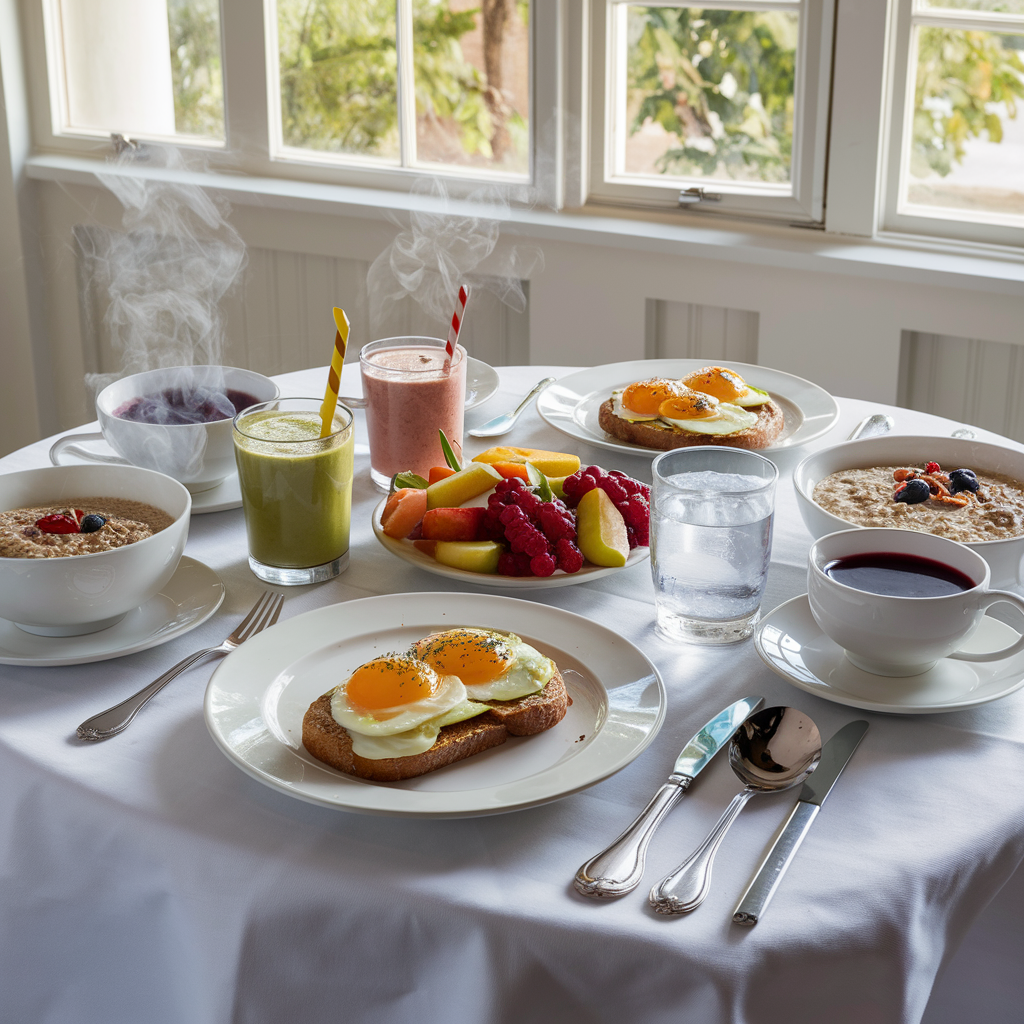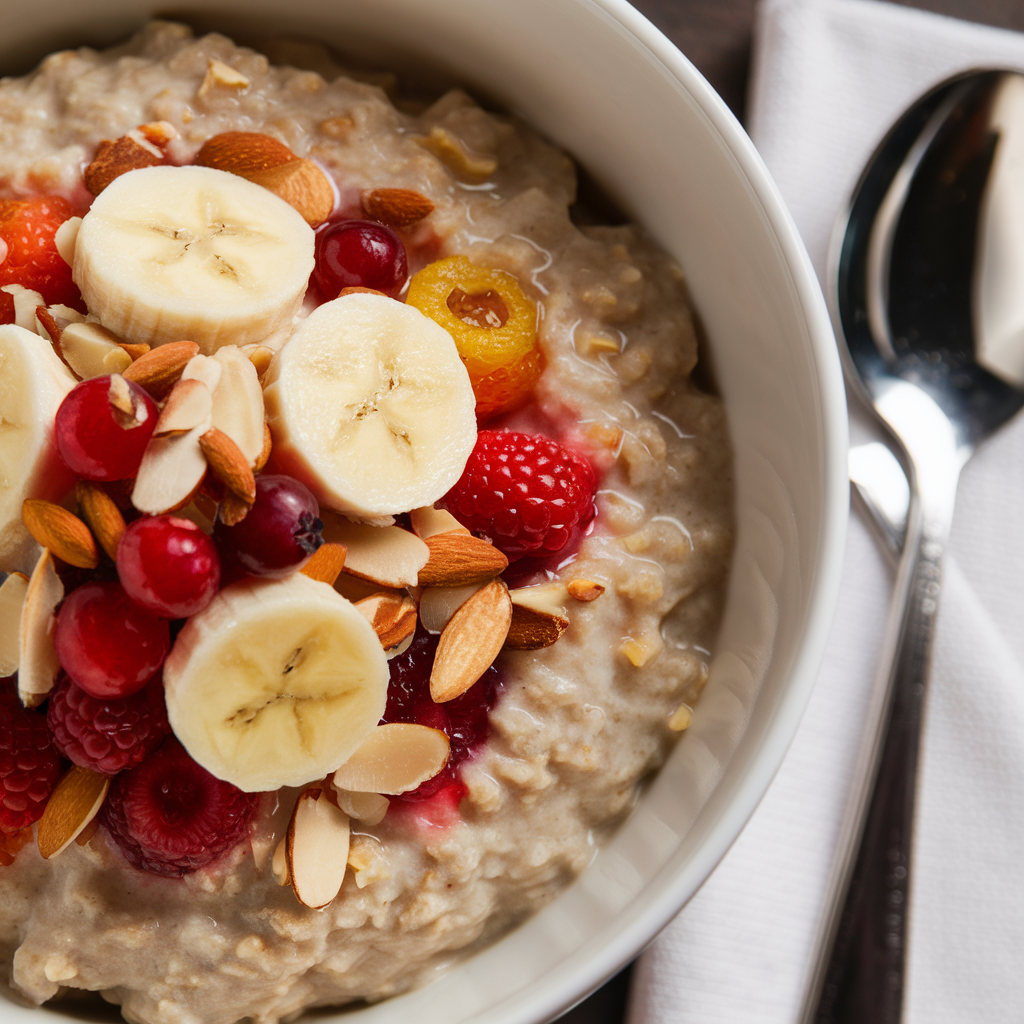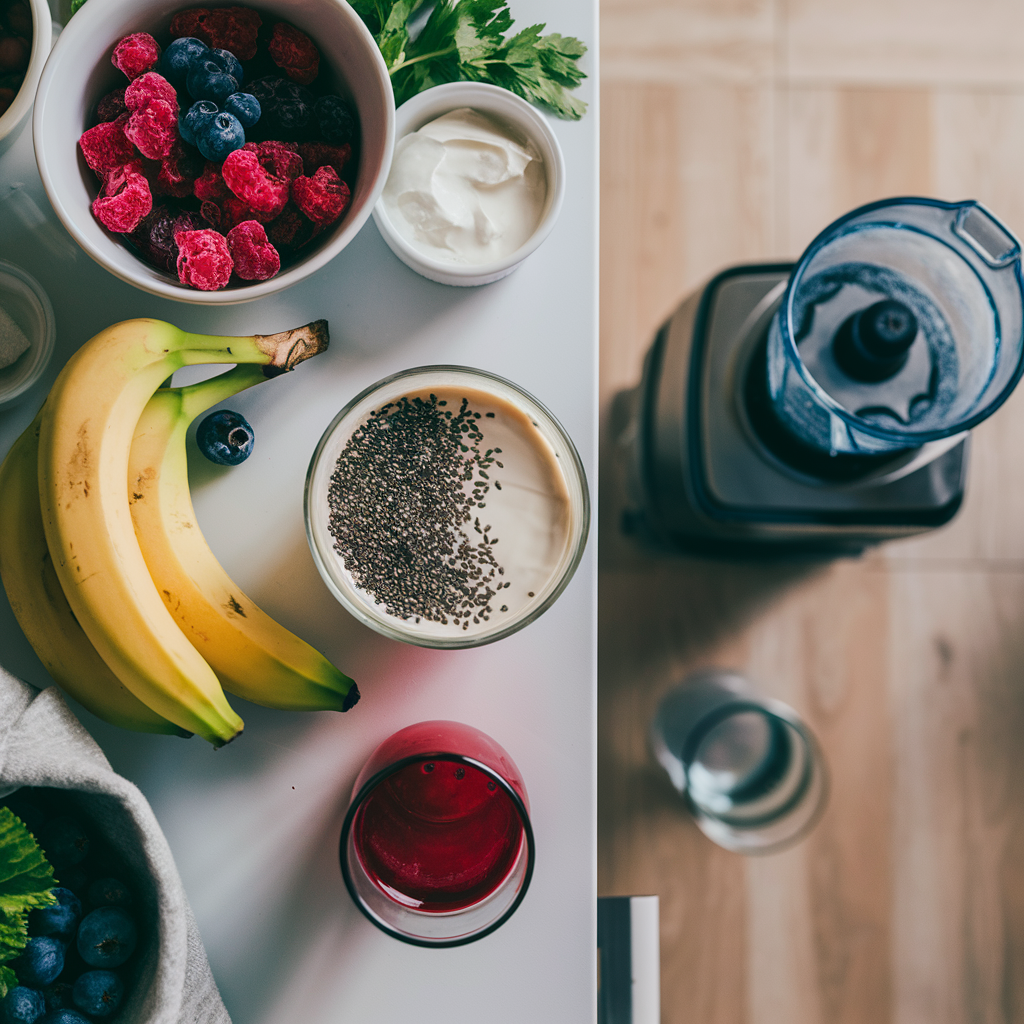Table of Contents
Introduction

Breakfast plays a crucial role in preparing your body for physical activity. Whether you’re gearing up for an intense workout or a casual team game, starting your day with the right meal can significantly impact performance. Consuming the right foods not only boosts energy but also supports endurance and recovery.
This article dives into what makes a pre-sport breakfast effective. We’ll cover the science of pre-sport nutrition, key breakfast components, meal timing, and top options for various sports. Plus, we’ll discuss common mistakes, hydration tips, and FAQs to help you start every athletic endeavor at your peak.
The Science Behind Pre-Sport Nutrition
Understanding Energy Needs for Sports
Before starting physical activity, your body needs specific nutrients to fuel muscles, maintain stamina, and keep fatigue at bay. Carbohydrates give you the primary energy boost by turning into glucose, which muscles use during exercise. Alongside carbs, proteins help with muscle repair and recovery, while healthy fats supply long-lasting energy, especially for extended activities.
Eating the right mix of these nutrients ensures your body performs at its best. For example, activities like running or swimming benefit from more carbohydrates, while strength-focused sports may need a boost in protein.
The Right Time to Eat
When you eat your pre-sport meal matters as much as what you eat. A complete meal works best when eaten 2-3 hours before exercise. This gives your body enough time to digest the food and avoid discomfort. If you’re in a hurry, a light snack like a banana or an energy bar can help if eaten 30-60 minutes before starting your activity.
The kind of sport also changes how soon you should eat. High-intensity workouts need more digestion time, while gentler activities like yoga are more flexible. Testing out different meal times can help you find what works for your routine.
Breaking Down Nutrients
Each type of nutrient helps your body in a unique way during exercise:
- Carbohydrates: Foods like oats or whole-grain bread are easy to digest and provide quick energy. Aim to include 3-5 grams of carbs for every kilogram of your weight.
- Proteins: Adding 10-20 grams of protein to breakfast helps muscles recover and feel less sore after a workout. Eggs, Greek yogurt, or a protein shake are great options.
- Fats: Healthy fats like avocado or nuts give you lasting energy. However, eating too much fat can slow digestion, so pair it with carbs and protein for balance.
Balancing these nutrients helps your body stay energized and prevents tiredness during activity.
The Role of Vitamins and Minerals
Vitamins and minerals also help boost your performance. For example:
- Iron: Carries oxygen in your blood, which helps with endurance.
- Calcium: Keeps muscles moving and stops cramps.
- B Vitamins: Convert food into energy for your body.
Adding fruits, veggies, and fortified foods to breakfast makes it easy to include these essential nutrients.
Essential Components of a Pre-Sport Breakfast
1. Carbohydrates: The Primary Fuel Source
Carbohydrates are the cornerstone of any effective pre-sport breakfast. They supply glycogen, which fuels your muscles during activity. Complex carbs, such as oatmeal, whole-grain bread, or brown rice, are particularly effective because they release energy steadily, preventing sudden drops in blood sugar.
In contrast, simple carbohydrates like fruits or honey are digested quickly and provide an instant energy boost. Combining complex and simple carbs can ensure sustained energy for prolonged activities. For instance, pairing a slice of whole-grain toast with banana slices balances immediate and long-lasting fuel.
2. Proteins: Supporting Muscle Health
Protein is essential for muscle repair and minimizing soreness after exercise. Although it’s not a primary energy source, it plays a vital role in maintaining muscle strength during workouts. Foods like eggs, Greek yogurt, lean meats, or plant-based options like tofu and legumes are excellent sources.
For a balanced breakfast, try scrambled eggs on whole-grain toast or a protein smoothie with yogurt, milk, and fruits. Aim for about 10-20 grams of protein depending on your body weight and activity level.
3. Healthy Fats: Sustained Energy for Longer Workouts
Healthy fats can enhance stamina, especially for activities lasting over an hour. Foods such as avocado, nuts, seeds, or nut butter provide this type of fat. However, fats digest more slowly, so they should only make up a small portion of your pre-sport meal.
For example, spreading almond butter on toast or adding chia seeds to oatmeal offers energy without overloading your stomach. Avoid greasy or fried foods as they can cause digestive discomfort.
4. Hydration: The Often Overlooked Component
Hydration is a critical part of any pre-sport meal. Starting your day well-hydrated helps maintain blood flow and body temperature, which are essential for peak performance. Water is usually sufficient for shorter activities, but drinks with electrolytes can help if you’re exercising for longer periods or in hot conditions.
For an energy-boosting drink, try water with a splash of lemon or a low-sugar sports drink. Avoid beverages with high sugar or caffeine levels, as they can lead to dehydration.
5. Fiber and Digestibility
While fiber is essential for overall health, it can be tricky before sports. High-fiber foods, like beans or large portions of vegetables, may cause bloating or discomfort. Instead, stick to moderate fiber options like oatmeal, fruits, or whole grains.
The goal is to eat foods that your body digests comfortably and that won’t weigh you down during activity. Testing different meals during training can help you find the right balance.
6. Combining the Components for Optimal Performance
An ideal pre-sport breakfast incorporates all these components. A balanced meal might include oatmeal topped with sliced banana, a boiled egg, and a small handful of nuts. Alternatively, a smoothie with Greek yogurt, berries, and a scoop of protein powder can provide a quick, nutrient-packed option.
The key is to customize your breakfast based on your personal needs, preferences, and the demands of your sport. With the right mix of nutrients, you can ensure your body feels ready to perform at its best.
Top Breakfast Options for Athletes

1. Oatmeal: A Versatile Powerhouse
Oatmeal is one of the most popular choices for athletes, and for good reason. It provides slow-digesting carbohydrates that deliver steady energy during workouts. To make it more appealing and nutritious, you can customize your bowl with various toppings. Add fruits like bananas or berries for natural sweetness, toss in nuts or seeds for healthy fats, and finish with a dollop of yogurt for protein.
For an extra boost, drizzle honey or mix in a spoonful of peanut butter. This breakfast works particularly well for endurance activities like running or cycling, as it sustains energy over time.
2. Smoothies: Quick and Nutrient-Dense
Smoothies are a fantastic option when you’re short on time but need a nutrient-packed meal. These drinks allow you to blend a variety of healthy ingredients into one glass. For example, you can start with Greek yogurt, milk, or a plant-based base, then add frozen berries, mango, or bananas for natural sugar and antioxidants.
To enhance the nutritional value, include a scoop of protein powder, a handful of spinach, and chia or flaxseeds. Smoothies are easy to digest, which makes them perfect for eating closer to your workout time. Experiment with different combinations to find your favorite.

3. Eggs and Whole-Grain Toast: A Classic Combo
Eggs paired with whole-grain toast create a winning combination for athletes. While eggs supply high-quality protein and essential amino acids for muscle recovery, the toast provides carbohydrates for sustained energy.
Enhance this meal with avocado slices on the toast for healthy fats or a side of fresh fruit for vitamins. Prepare eggs in various ways—boiled, scrambled, or as an omelet with veggies—to suit your taste. This breakfast is particularly effective for strength training or high-intensity interval workouts.
4. Energy Bars: Portable and Convenient
Energy bars are an excellent choice for athletes who are constantly on the move. Compact and nutrient-packed, they are easy to carry and prepare. When selecting an energy bar, look for a balanced mix of carbohydrates and protein, minimal added sugar, and natural ingredients like oats, nuts, and dried fruits.
To make the meal more substantial, pair an energy bar with a piece of fruit or a small yogurt. Together, these create a well-rounded breakfast that’s quick and effective.
5. Yogurt Parfaits: Light Yet Filling
If you prefer a light but satisfying breakfast, yogurt parfaits are a great option. They combine Greek yogurt with granola and fruits, offering a balanced mix of carbs, protein, and a touch of fat. Unsweetened yogurt keeps the sugar content low, while fresh fruits like strawberries or blueberries add natural sweetness.
For extra texture, sprinkle some nuts or seeds on top. This meal is especially suitable for morning yoga, pilates, or other low-impact exercises where a heavy breakfast isn’t necessary.
6. Nut Butter and Banana Toast
This simple yet effective meal delivers everything an athlete needs. Whole-grain toast and banana slices supply carbohydrates for quick energy, while almond or peanut butter provides healthy fats. Bananas are also rich in potassium, which helps prevent muscle cramps, making this meal especially useful for moderate-intensity sports.
It’s easy to prepare and keeps you energized without feeling too full.
7. Pancakes with a Twist
For those who enjoy a heartier breakfast, whole-grain or protein pancakes are an excellent choice. Toppings can transform this meal into a nutrient-dense option. Instead of syrup, use fresh fruits for natural sweetness, Greek yogurt or nut butter for protein, and a sprinkle of chia seeds for added fiber.
Protein pancakes, made with oats and eggs, are particularly effective for strength-focused activities. They provide sustained energy for longer workouts.
8. Rice Bowls: Savory and Satisfying
Rice bowls are ideal for athletes who prefer savory breakfasts. Start with a base of brown rice or quinoa, then top it with a boiled or fried egg for protein. Add steamed spinach or kale for vitamins and minerals, and finish with a drizzle of olive oil or sesame seeds for healthy fats.
This meal works especially well for long-duration activities, as it provides a blend of macronutrients that sustain energy.
Ultimately, your breakfast should match the intensity and duration of your activity. For shorter workouts, a lighter meal like a yogurt parfait or smoothie may be sufficient. Conversely, endurance events require larger meals, such as oats, toast, or rice bowls, to provide the necessary fuel.
Testing different options during training helps you identify what keeps you energized and comfortable. Tailoring your meals to the demands of your sport ensures that you can perform at your best every time.
Common Mistakes to Avoid and FAQs
1. Common Mistakes to Avoid
1.1 Overeating Before Sports
While eating breakfast before sports is crucial, consuming too much food can lead to discomfort, bloating, or even nausea. Eating a heavy meal shortly before physical activity may also slow digestion, diverting energy from your muscles to your stomach. Stick to moderate portions, and allow adequate time for digestion, typically 2-3 hours.
1.2 Ignoring the Importance of Hydration
Dehydration is one of the quickest ways to compromise performance. Many athletes focus solely on food and forget that fluids are equally vital. Start your day with a glass of water and continue sipping throughout your meal. For endurance events, include an electrolyte-rich beverage to replenish salts lost through sweat.
1.3 Choosing Foods That Are Hard to Digest
High-fat or fiber-heavy meals may cause digestive issues like cramps or discomfort during exercise. Although fiber is essential for overall health, consume it in moderate amounts before your workout. Instead, opt for easily digestible foods like bananas, toast, or yogurt.
1.4 Skipping Breakfast Altogether
Skipping breakfast deprives your body of the energy and nutrients it needs to perform well. This can lead to fatigue, poor focus, and decreased stamina. Even if you’re short on time, a simple snack like an energy bar or a smoothie is better than exercising on an empty stomach.
1.5 Eating Too Close to Exercise
Timing is key. Eating just before your workout can lead to an upset stomach, as your body struggles to digest food and fuel your muscles simultaneously. Allow at least 30-60 minutes after a light snack or 2-3 hours after a larger meal.
2. FAQs
2.1 Is it better to eat before or after sports?
Both pre- and post-sport meals are important. Eating before sports provides the energy needed for optimal performance, while eating afterward aids in recovery. For best results, consume a balanced breakfast with carbs and protein before your activity, and follow up with a recovery meal or snack after.
2.2 What happens if I skip breakfast before sports?
Skipping breakfast can leave you feeling fatigued, lightheaded, or unable to sustain high performance. Your body lacks the fuel to power your muscles, leading to quicker exhaustion.
2.3 How do I avoid feeling heavy during exercise?
To prevent feeling sluggish, choose light, easily digestible foods and avoid overeating. Focus on carbs for quick energy and eat your meal 2-3 hours before the activity.
2.4 Can I drink coffee before sports?
Yes, drinking coffee before sports can enhance performance due to its caffeine content, which boosts alertness and energy levels. However, avoid overdoing it, as too much caffeine can cause jitters or dehydration.
2.5 What are good pre-sport snacks?
Good pre-sport snacks include bananas, energy bars, yogurt, a handful of nuts, or a small smoothie. These snacks are easy to digest and provide a quick energy boost.
2.6 Can kids follow these breakfast ideas?
Yes, most of these breakfast ideas are suitable for children. Adjust portion sizes based on their age and activity level. Ensure their meals include carbohydrates, protein, and healthy fats to support their growing bodies and active lifestyle.
Conclusion
Choosing the best breakfast before sports can significantly impact your performance, endurance, and overall energy levels. A well-balanced meal that combines carbohydrates, protein, and healthy fats provides the necessary fuel to power through physical activity while supporting muscle recovery. Hydration, often overlooked, is equally important to keep your body functioning optimally during exercise.
From oatmeal and smoothies to eggs on toast or energy bars, the best breakfast options are those that match the intensity and duration of your activity. By avoiding common mistakes like overeating, skipping breakfast, or eating too close to your workout, you can create a routine that works for your body and your goals.
Ultimately, the key is to experiment and tailor your breakfast to meet your personal needs. Whether you’re gearing up for a long run, a high-intensity workout, or a light yoga session, preparing your body with the right meal ensures that you perform at your best. So, start your day with the fuel your body deserves and enjoy the results in your athletic endeavors.

3 thoughts on “What is the Best Breakfast to Have Before Sport? Top Tips and Ideas”